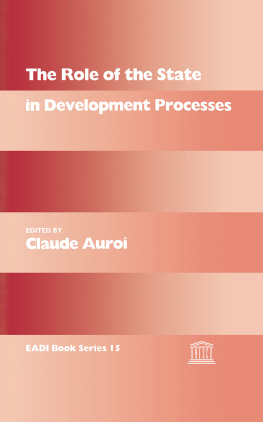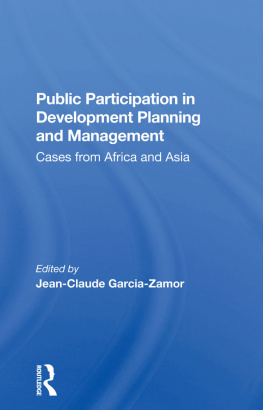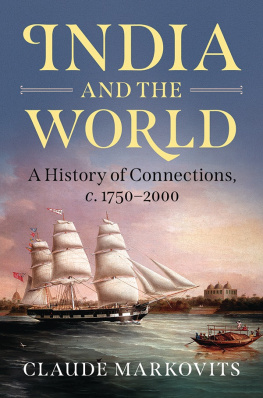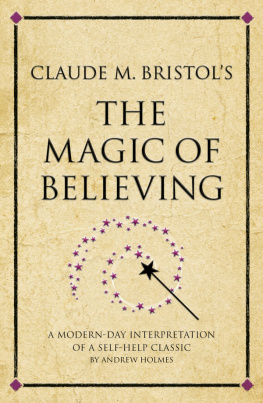First published in 1992 in Great Britain and in the United States of America by
FRANK CASS & CO. LTD.
Published 2013 by Routledge
2 Park Square, Milton Park, Abingdon, Oxon OX14 4RN
711 Third Avenue, New York, NY 10017 USA
Routledge is an imprint of the Taylor & Francis Group, an informa business
Copyright 1992 EADI and authors
British Library Cataloguing in Publication Data
Role of the State in Development
Processes (EADI Book Series; Vol. 15)
1. Auroi, Claude II. Series
320.1
Library of Congress Cataloging-in-Publication Data
The role of the state in development processes/ edited by Claude Auroi.
p. cm. (EADI-book series; 15)
Includes bibliographical references.
ISBN 978-0-7146-3493-7
ISBN 978-1-3150-3588-8 (eISBN)
1. Economic developmentPolitical aspects. 2. State, The. 3. Industry and state. I. Auroi, Claude, 1944- II. Series.
HD87.R65 1992
338.9dc20
92-26250
CIP
All rights reserved. No part of this publication may be reproduced in any form or by any means, electronic, mechanical, photocopying, recording or otherwise, without the prior written permission of the publisher.
CLAUDE AUROI
In the 1970s, the state was already the subject of an ongoing debate, but one which focused on different aspects to those which would be discussed two decades later. Today, the form of government is questioned and the withdrawal of the state is on the agenda, whereas 20 years ago the debate centred on the nature of the state and the state building process. The concerns, especially among young nations, focused on which type of state system would best guarantee the coming into being of an organised nation, socially integrated and with an economic structure capable of ensuring rapid development.
The ideological debate was relatively simple since two major currents dominated the world and corresponded to a reality which had as symbols the Western type of state and the Marxist state.
Admittedly, each current encompassed various tendencies which, in their analysis, emphasised different elements and even reached diverging conclusions. But the fundamental debate did focus on socialist state versus 'bourgeois' state.
Though the dichotomy appeared irreducible, the two ideologies of the state had nevertheless several points in common. The main one was the will to build a 'strong' state. The qualifying adjective meant that the entity called 'state' took over the responsibility for a multitude of activities or services, whether as a Welfare state - the most accomplished example being the Swedish model - or as a state modelled on the neo-Stalinist pattern where the productive machinery itself was planned and controlled by the state. Henri Lefebvre said:
The importance of Stalinism in the World does not stem from the fact that it is a specific Russo-Sovietic phenomenon but that its development has influenced and has been followed not only by socialist countries but also in so-called capitalist countries. Everywhere the state assumes the management of the entire society even under a liberal system.
Although this affirmation may seem extreme, it was not without foundation for the authoritarianism a state was supposed to display to exercise its power.
Several reasons were put forward to justify the real and symbolic violence exercised by the state. On the one hand the needs of the class struggle, of the fight against imperialism, and on the other those of institutional building, social integration and the defense against communism.
On the periphery, the paths to state building proved to be surprisingly converging despite some apparent ideological differences. To build a new state, neither the 'liberation movements' in countries still under colonial domination nor the political parties struggling to overthrow established governments had any alternative to offer to centralism and authority.
However, some authors warned against the transfer of concepts developed under other latitudes. The notion of 'authenticity', though subsequently hackneyed by some states, had appeared earlier than the 1960s. Its origins have been more typically African and are linked to a concern for the recognition and rehabilitation of the History of that continent. Cheik Anta Diop and Joseph Ki-Zerbo among French-speakers as well as English-speaking historians and politicians such as Azikiwe, Nkruma, Nyerere, Jomo Kenyatta etc. had raised the question of borrowing external modes of institutional and economic functioning.
But the voices which asked for models different from those proposed by Western or Eastern Europe, or the United States, did not get much echo at the time. Though one can wonder at the speed at which the nation-state collapsed at the end of the 1980s, the reasons for such collapse cannot be considered surprising. Yves Person had properly perceived the fragile nature of these new states when writing in 1977:
Then, the nation-state became the favoured framework for this phenomenon (the building of a social structure of domination) though it had lost the role of market creation which it performed in the 18th century ideology. But the ideology of the absolute sovereignty of the state - of the state as absolute subject - and of the contract between abstract citizens is faithfully reproduced, because it justifies the marginalisation of the masses, which are the bearers of the national culture, and their exploitation with the view of sustaining the whole system. Physical violence not being enough, ideology and education impress upon those masses the violence of symbols which consider them with spite. Domination requires that dominated people live in a culture of dominated.
On every aspect of state intervention in the field of social life action was based on open or hidden use of violence.
The concept of 'civil society' was little referred to by the generation of the 1960s and 1970s to whom its true relevance was not obvious since efforts were exclusively devoted to state building. On the contrary, nowadays it is perhaps the newest element in the debate on the role of the state in the development process. The failure of the state results from its inability to solve the crisis it had to face and thus alternative models must be sought. As Paulin J. Houtondji writes 'people have become bolder and are no longer afraid of crying out their demand for liberty'. Everywhere, civil society has become a determinant of great weight to be reckoned with in development strategies, and not merely to be considered in a perspective of manipulation. Nolens valens it will be highly improbable to do away with the state, but its nature will need to be redefined so as to be reconciled with the usurped authenticity. Only to this condition will a consensus be able to emerge from the civil society/institutions dialectic, and the state capable of functioning again in a climate of acceptance of its role as coordinator and a strong support in the development drive, but no longer as the only leading force.












